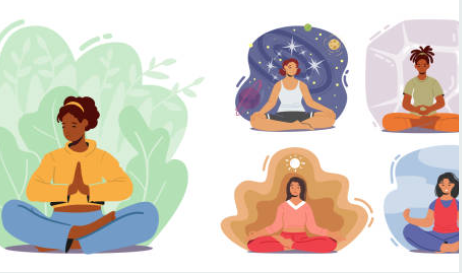What Self-Care is Not
Having self care doesn’t mean giving yourself everything you desire, but it does mean doing what you feel is best for you. This includes making decisions with your own personal best interest in mind and setting limits for yourself.

Selfpause Affirmation App
Download the app to get 1,000’s of affirmation meditations and everything you need to write, record and listen to your own.
Set boundaries

Often, people struggle to set boundaries. They may think their life will fall apart if they reduce their commitments. In reality, they will feel better because they are able to keep their commitments at a minimal level.
If you have a difficult time setting boundaries, you may need to reevaluate your needs. If you do not exercise regularly, for example, you may need to set self-care boundaries. Setting boundaries can help keep you from feeling resentful and overwhelmed.
When you set boundaries, you are expressing your needs in a respectful manner. You are letting others know what you are willing to sacrifice in order to keep your relationships strong.
If you do not set limits, you may end up resenting others. This can lead to mental distress, stress, and financial burdens. It can also strain relationships.
Setting boundaries can be difficult, especially when you are alone. When you feel the urge to give, you should keep in mind that you are not a bad person. Setting boundaries does not mean you are not interested in others. However, you should be assertive and firm when necessary.
In order to set boundaries, you should not over-explain them. You should also consider the other person’s motives. Some people may try to manipulate you with guilt. You should consider your own motives and not back down because of hurt feelings.
Often, when you set boundaries, you may feel embarrassed. In addition, you may be wishing that things were the same. Fortunately, it is not always necessary to set boundaries in a traditional manner. It can be as simple as saying, “I can’t go to that party tonight.”
You should also remember that you have to respect boundaries. This means that you can be kind, but never lose sight of your own needs.
Allow yourself to feel emotions

Embracing your emotions is a great way to boost your emotional health. Emotions are an important part of our identity. Not only can they help us get through the day, they can also give us information about our lives.
For example, if you are dealing with anger, you might be feeling disgusted, betrayed or disappointed. The best way to deal with these emotions is to understand them. If you can understand them, you can then make wise choices.
Emotions can be very confusing. One of the best ways to understand them is to write down your feelings. This can be done through a journal or by recording your feelings mentally. If you write down your feelings, you will be able to identify what your triggers are. You might even learn that your anger is actually a sign that your partner is not respecting your boundaries.
Another good idea is to find a friend or family member to help you with your emotions. Talking about your feelings can be a great way to make them less intense and can have a therapeutic effect on your brain.
Practicing emotional self-care is more than mani-pedis or massages. It’s about learning to listen to your inner voice and honouring it. It will help you to feel better, and can even lead to a happier, healthier life.
Emotions are essential to our health and wellbeing. Not honouring our emotions can lead to burnout and general restlessness. It also can impede our personal growth. In some cases, you may even need help from a therapist.
Learning how to handle strong emotions can be challenging. You may have to seek help from a therapist or an adult you trust. In the meantime, it is important to know that you deserve to feel all your emotions.
Avoid instant gratification

Having a healthy balance of instant gratification and delayed gratification is very important. You can find a healthy balance by making sure you are aware of your triggers. This way, you are more likely to stay away from temptation. You can also use better impulse control and make positive choices.
Instant gratification has many negative effects. For example, it can lead to procrastination, which can result in missed opportunities for extra money. In addition, it can lead to unhealthy addictions. So, if you are looking for ways to avoid instant gratification for self care, you should look for allies and learn how to make positive choices.
You should also think about your future mental state. You should be able to resist instant gratification if you think about your future goals and make sure you’re ready to make those goals a reality. If you’re not sure how to accomplish this, consult with a qualified mental health professional.
Impulse control is an important life skill, and it can lead to many positive benefits. Having good impulse control will lead to healthier choices, including better diets. You’ll also be able to improve your personal growth and health. You’ll be able to find healthier food choices and avoid unhealthy snacks.
One way to improve impulse control is to write down rules that you’ll stick to. For example, you might choose to avoid the candy store. You might also choose to have a healthy meal instead of an unhealthy one. If you are hungry, you can grab an apple instead of a chocolate brownie.
You can also set your phone in a drawer to avoid distractions. If you’re too tired to focus, you might get distracted by the smell of donuts.
Keep up with the Joneses

Keeping up with the Joneses is a term originating from the comic strip Keeping Up With the Jones. It refers to the practice of comparing one’s lifestyle with others. It is a bad habit that can lead to unhealthy obsessions and even breakups.
This comic strip discusses the dangers of comparing one’s life to others. It also addresses the problem of comparing one’s life to that of other neighbors. In order to avoid this problem, it is important to create one’s own vision of success.
Keeping up with the Joneses isn’t a winning race. It’s a never-ending cycle that doesn’t benefit anyone. People who keep up with the Joneses have an unhealthy obsession with material possessions. They spend money on items they can’t afford, leading to stress and debt. Trying to keep up with the Joneses will never lead to financial success.
Creating your own financial path is a great way to avoid comparison. For example, if you buy a new couch, make sure you explain to your family why you purchased it. This will help you avoid wasting money on something that will become obsolete in a few years.
Another great example is vacations. You don’t have to buy a new house in order to get away. If you have the money, a vacation is a great way to spend it. It’s also a good way to show your family that you’re responsible with your money.
While it’s tempting to compare yourself to your neighbors, focusing on your own life and accomplishments can help you avoid wasting time and money on things you can’t afford. You can also impress your neighbors by being generous and giving them the advice they need.
Our Top FAQ's
Some common misconceptions about self-care include the belief that it is indulgent or selfish, that it is only about pampering oneself, or that it is only necessary for people who are struggling with mental health issues. However, self-care is actually an important aspect of overall health and well-being, and it can take many different forms, including physical activities, self-reflection, and social connection.
No, engaging in unhealthy or destructive behaviors is not considered self-care. Self-care should be nourishing and supportive to our overall well-being, rather than harmful or destructive. Examples of unhealthy or destructive behaviors might include excessive drinking or drug use, engaging in unhealthy or unsafe relationships, or neglecting personal responsibilities.
Genuine self-care should support and nourish your overall well-being, while avoidance or escapism may provide temporary relief or distraction but ultimately undermines your well-being. One way to distinguish between the two is to consider whether the activity or behavior is ultimately supportive or harmful to your physical, mental, and emotional health. Additionally, genuine self-care often involves actively addressing and dealing with challenges or stressors, rather than simply avoiding them.
It is possible to engage in too much of any activity, including self-care. While it is important to prioritize self-care and make time for it in your life, it is also important to find balance and not let it become an unhealthy obsession or a way to avoid dealing with responsibilities or challenges. It is also important to remember that self-care is just one aspect of overall well-being, and it is important to prioritize other areas of your life as well, such as work, relationships, and personal growth.
It can be challenging to find the right balance between taking care of ourselves and meeting the demands and obligations of our daily lives. One approach is to prioritize self-care as an essential part of maintaining our overall well-being and effectiveness, rather than viewing it as an optional or indulgent activity. This can help to make self-care a regular and integrated part of our lives, rather than something we only do when we have time or feel overwhelmed. It can also be helpful to set boundaries and communicate clearly with others about our needs and priorities, and to seek support when needed to manage our responsibilities and obligations.
